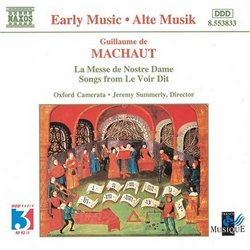| All Artists: Guillaume de Machaut, Oxford Camerata, Robin Blaze Title: Machaut: La Messe de Nostre Dame; Songs from Le Voir Dit Members Wishing: 0 Total Copies: 0 Label: Naxos Original Release Date: 1/1/1996 Re-Release Date: 12/17/1996 Genres: Pop, Classical Styles: Vocal Pop, Opera & Classical Vocal, Forms & Genres, Ballads, Rondos, Historical Periods, Early Music Number of Discs: 1 SwapaCD Credits: 1 UPC: 730099483322 |
Search - Guillaume de Machaut, Oxford Camerata, Robin Blaze :: Machaut: La Messe de Nostre Dame; Songs from Le Voir Dit
 | Guillaume de Machaut, Oxford Camerata, Robin Blaze Machaut: La Messe de Nostre Dame; Songs from Le Voir Dit Genres: Pop, Classical
|
Larger Image |
CD Details |
CD ReviewsMind blowing Machaut! K. Farrington | Missegre, France | 03/17/2000 (5 out of 5 stars) "Last year I did my Masters' dissertation on Mediaeval Scholasticism and discovered this CD at about the same time. I played it softly on my CD player as I walked the 'via dolorosa'. The CD helped me do very well because I feel it has a unique Mediaeval/Renaissance crossover feel that enabled me to internalise what these people were thinking. The plain lines of Gregorian Chant have been replaced with a three harmony glory which darts about the aisles and chapels of Reims Cathedral, slowing and speeding, lowering and soaring and totally gripping with its harmonic complexities. If there is a summation of the glories of the late 14th century it would be Aquinas' Realism, synthesised by Scotus and finally brought through to the nominalism of William of Ockham, the writings of Dante, Petrarch, Boccacio and Chaucer and this wonderful music. This is not simple rustic music of the home spun English at Crecy. This is the musical depiction of French civilization at its zenith, with its famous manuscripts like the Bible of Jean de Papelou it the Hours of Jeanne D'Evreux. The Romanesque style with its lapis lazuli blues and its idealising of courtly love in scenes that show this earth and the next are the nearest we have to visualisation of this absolute music. I see Decorated Gothic Stain Glass Windows and the most intricate Flying Buttresses which are a silent witness to this music which tantalisingly stands in the changing of worlds. The Black Death was only twelve years away and the old order would be challenged in ten more by uprisings in France and the Peasants' Revolt in England in 1381. The ancien regime would hold on to power but the rediscovery of the ideas of Greece and Rome would change the West's ideas about itself for ever. The New World would crystalize all this but that is in the future. This CD portrays this mediaeval world which fascinates us today with its peculiar mixture of beauty and barbarism. Great value and brilliant at any price with 77 minutes of beatifully written and performed music." As Machaut heard it in the Reims Cathedral conquistador69 | 11/01/1999 (5 out of 5 stars) ""La Messe de Notre Dame" by Guillaume de Machaut is one of the earliest settings of the Mass by a single composer.The Oxford Camerata,in the Reims cathedral,so the would match the same accoustics as those that must of been heard when the work was first premiered in 1364. the rest of the songs are from "Le voir dit" The liner notes of this recording tell how it was possible to match with great fidelity the accoustics of the Reims Cathedral.This is one of my favorites recordings in my private collection. Questions and comments are greatly appreciated." Getting to know 14th.century music Rev. Ben Cox | 08/14/2000 (4 out of 5 stars) "This recording of early music is wonderful in its sound quality and acoustics. It is truley a masterpiece. Just keep in mind that music of this period is not the bright or danciful folk tunes often heard in 16th or 17th.century folk songs. This recording is of the developing formal mass and represents the highest level of performing skills of the period."
|

 Track Listings (12) - Disc #1
Track Listings (12) - Disc #1